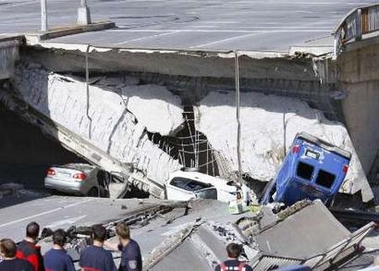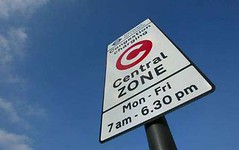Crazy stupid policy proposals

Rescue workers at the scene of a collapsed highway overpass road in the Montreal suburb of Laval. Reuters photo.
Only in the United States, could someone like John McCain be called "not conservative enough" by conservatives. I mean, so he doesn't hate immigrants, and he believes in controls on the excess of donations to political campaigns. Other than that, how independent minded is he really?
So he suggests "a summer break in gas taxes" according to the Associated Press. Somehow, do the costs of maintaining roads or of maintaining the U.S. military overseas go down over the summer?
Last week, Owen Gutfreund, author of a book on sprawl, had an op-ed in the New York Times, "Pick on the Big Guys," with a very trenchant point:
So what do we do? How do we escape the trap we’re in: an obsolete and counterproductive transportation policy that has led to clogged roads and broken-down highways, and a political system that seems incapable of dealing with these problems? We should start by adjusting tolls to take into account the vehicle’s cost and fuel efficiency and the wear and tear on roads that different cars cause.
One main criticism of higher tolls and fees — indeed it came up in Albany this week — is that they are regressive, imposing a greater burden on drivers with lower incomes. By this logic, the current system that most states and localities use for highway financing, relying on revenue from income and property taxes, is fairer. But maintaining this approach perpetuates a status quo that is unsustainable and frustrating.
The point that he makes that is apparently subtle, is that approximately 50% of the cost of roads is covered by general funds local and state tax revenues, not by car registation fees, other taxes, and gasoline excise taxes..
He has another suggestion but I would say this....
If you're concerned about regressive aspects of congestion prices, don't not charge congestion prices, merely create a means-tested system for the people that you want to encourage to drive, I mean for lower-income people, so that they can get a partial rebate on the congestion fees/tolls that they pay over the course of a year. Still you ought to charge back a portion for the cost of U.S. military intervention overseas, since for the most part it's devoted to maintaining access to oil supplies.
That of course isn't really the issue. Roads are roads. If you drive on them, you drive on them, and that's probably the issue, not income. But that is a way to address the question of how to deal with allegedly regressive aspects of congestion pricing, without eliminating the consideration of congestion charges altogether.

Plus, I was reading Professor Pucher's paper today, "Making Cycling Irresistable," and I got to thinking about the hated personal property tax on automobiles. (European countries charge a lot more money for car registration, for getting a license--It's close to $2,000 to get a drivers license in Germany, and for gasoline excise taxes. So I was thinking about the different types of policies between North America and Europe.) I never understood why it was assessed other than to generate revenue for governments, but now--not that this is how it had been justified--you could argue that the justification for a personal property tax on automobiles--if properly directed, it should go towards transportation infrastructure creation and maintenance--has to do with recovering the costs of the road infrastructure.
In a city like DC, 40% of households don't have cars. Those households wouldn't have to worry about paying for the cost of roads in part through a personal property tax on autos, because they don't have autos.
Yes, there are some free rider issues, but likely that could be considered to be covered as part of the normal taxation stream--covering use while using transit, walking, bicycling, and the benefits of maintaining a road network to support the delivery of freight.
Labels: electoral politics, progressive urban political agenda, public finance, sustainable land use and resource planning



0 Comments:
Post a Comment
<< Home